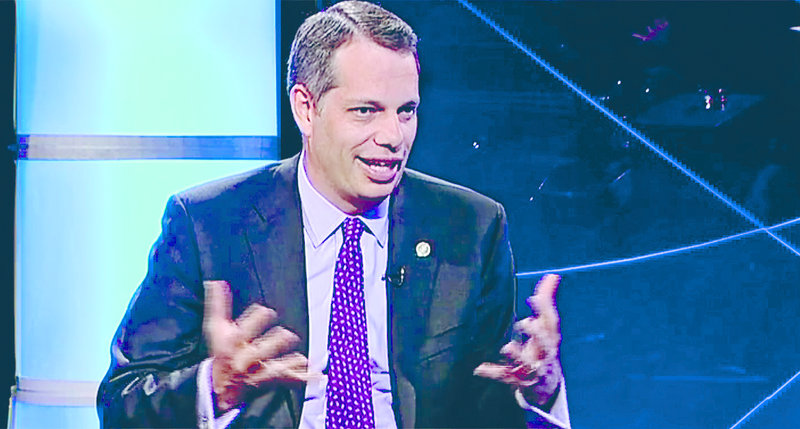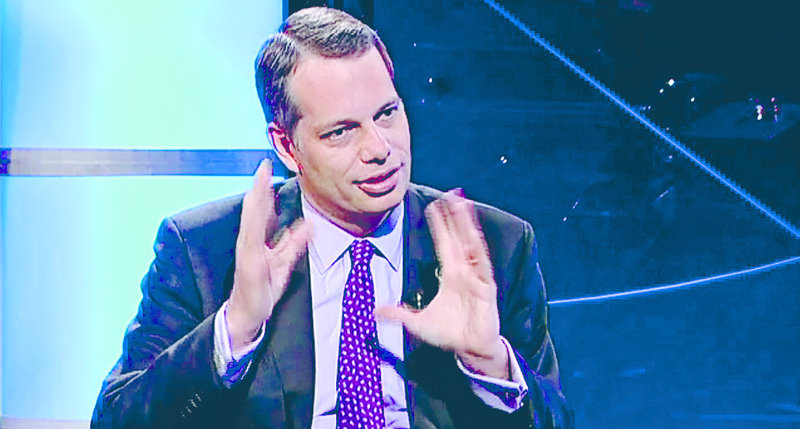Interview
Marcos Mandojana
US Consul General in Barcelona
Friends and allies
Established 218 years ago, the US consulate in Barcelona has long been at the centre of bilateral relations
Marcus Mandojana Each Wednesday at 7.10 pm, El Punt Avui TV airs the series of interviews, Catalan Connections. Marcela Topor talked to the US Consul General in Barcelona, Marcus Mandojana.
We try to explain to Washington the points of view
We work hard to encourage investment and trade
Mr Mandojana, you took up your position in August. What has the experience been like so far?
Barcelona is a very popular destination among diplomats from all over the world, not only because of the reasons tourists come here: the climate, food, beaches, culture, music, but also because it is a very interesting position, a great consulate, and a lot of us applied for the job. I competed with 50 other diplomats for this position and I was lucky to win the lottery. I came here with my family and the experience has been fantastic since August; we feel very welcome here and we've really enjoyed travelling all over Catalonia.
The consulate in Barcelona has a long history.
It was founded 218 years ago, by our second president of the United States. America was a very young country back then, and Catalonia was a very important centre of commerce. For the US it was important to start a mission here and since then our trade has only grown.
You have travelled all over the world since very young.
My parents are both from Argentina and emigrated to the United States. My father was a doctor and went to Puerto Rico for a medical residency, and I was born there. Then we moved to Washington DC and he joined the US army as a doctor, so growing up we moved to several places, like Germany, Hawaii, Tennessee...it was an enriching experience. Then I found I wanted to be a doctor, too, and I went to college with that idea. But luckily, at our universities we take a variety of courses and I saw that my passion was international affairs. So I left the medical career and pursued the diplomatic one, and have continuously moved to various places ever since.
What is the longest time you've lived in one place?
The longest was four years, in my whole life, in high school in Tennessee and Virginia, near Washington DC. I'm very used to it now, I may even say I'm addicted to it.
When did you become a diplomat?
My undergraduate degree was in biology, and right when I was finishing university and had been accepted to medical school, I met an ambassador and I asked him about this career. So, I left my medical path and did an exam at Georgetown in international affairs and after the masters joined the foreign service in 2000.
After living and working in so many different countries how did you find Barcelona?
After seeing different countries in Asia, South America, Europe, I can say that it's hard to beat Barcelona. I had been here before about 13 years ago, for about 10 days, but since we came we have learnt a lot more about the city and Catalonia on the whole: the castellers tradition, the food and wine, the sea, the football...we've been in Girona for Temps de Flors, Tarragona, Lleida... Barcelona is a fantastic city and a perfect place.
What does the US consulate in Barcelona do?
We try to do a bit a bit of everything but our top priority is helping US citizens. There are some 20,000 living in our consulate district, plus 725,000 visited last year, plus 6,000 students who come to study in Catalonia each year, so that keeps us busy. But we also have the political function of following what's happening in Spain and Catalonia and trying to explain to Washington the different points of view of political officials. The same on the economic side: how is the economy going, what are the policies, what the future looks like. We help American companies that want to do business here, and we help companies from here to do business in the US, and we have this office of public diplomacy, which is getting close to the people, including social media, the student exchanges such as Fulbright exchanges – Catalan universities have 260 formal agreements with US universities. We do a lot of security cooperation, with all the officials, to make sure we keep our countries safe.
Where did your passion for Barça come from?
Part of it's my Argentine parents. When I was five years old I started playing soccer, and everywhere I've moved since I've still played. It's amazing how many children play soccer in the US, boys and girls. But what happens is that children wouldn't pursue it as a career, as for them in the US their idols are Michael Jordan in basketball or American football or baseball. But now there is a professional league and there is more interest in making it a professional career. And Barça is opening their first office in New York, which is very exciting.
There have been peaceful demonstrations on September 11 for four years. How is this seen from the US?
I saw the last demonstration last year. When they see the headlines in Washington and around the world, with so many people in the streets, we get a lot of questions: if there is violence, is there is a riot...But no, it's very peaceful, with families going there together. So one of the values of having a consulate and a local presence is that we can explain the reality, and the points of view. And about Catalonia in relation to Spain and independence, our position has remained the same, it is very clear: it is an internal matter for Spain, and as president Obama and secretary Kerry have said, Spain is an important ally for the US, and we want to keep relations with a strong and unified Spain.
The TTIP trade agreement between the US and the EU has been quite controversial, what is your opinion of it?
I am familiar with the controversy. I was fortunate enough to work on several trade agreements before, in South America and Asia. There is usually controversy with projects like that, especially at the end. The good news is that every trade agreement we've ever negotiated has been approved, implemented and passed. The one with Asia was very hard, a lot of different countries, different economies, but we've all been able to come to an agreement for something that's beneficial for our countries. So with Europe, we're very confident that, sharing an economy and values, if we came to an agreement with countries that were so different from us, we are close to coming to an agreement with the EU.
When will it be concluded?
Talks began in 2013. We've had 13 rounds and there's a 14th coming up in July. Our and the EU's goal is to try to finish negotiations by the end of year, for a few reasons: the change of US administration, and a lot of elections in Europe, not because we think the agreement can't be negotiated with other governments, but it's a delay
Is that realistic?
The US and the EU have known each other and had trade issues for a long time, and we know what the sensitive topics are on both sides. It's just a matter of political will to finish it, and I think there is that will. President Obama has repeatedly said that we have this goal and negotiators on both sides have said that it is possible. But I want to stress that it is not the end: the text is finished, the countries sign it, and then the text becomes public and then we have this process when every country has to implement and approve it, so it takes time after the text is agreed. Our goal is to finish the text and then we'll see how the public of each country reacts.
There are more and more US tourists coming to Barcelona, especially cruise liners.
We had 725,000 last year, which is an 11% increase on the previous year. And an important thing to note is that more than 40% of the Americans who stay in a hotel in Barcelona are here for business. In Catalonia, there are 700 US companies operating in biomedicine, communication, technology...
Is there a growing trend?
That's been the tendency: more and more investment, more trade, more exports. Exports from Catalonia last year grew by over 20%. Over 2,700 companies export from Catalonia to the US regularly and there are about 500 Catalan companies in the US. We are working hard to deepen this relationship and encourage investment and trade from both sides, so the trend is very positive.
Will you have the first woman president in the US?
We have the first woman finalist, and now it looks like Bernie Sanders is still in the race on the Democratic side. The numbers show that Hillary Clinton will most likely be the democratic nominee at the Convention in July, and on the other side Donald Trump for the Republican party. Until November a lot can happen. Right now polls are very close but it's the closest we've ever been to having a woman president of the US. It would be a nice thing to have at some point soon in the US, but it's really an unpredictable election this year, with so many candidates and so many opinions. It's a very interesting and different election from normal.
Leave a comment
Sign in.
Sign in if you are already a verified reader.
I want to become verified reader.
To leave comments on the website you must be a verified reader.
Note: To leave comments on the website you must be a verified reader and accept the conditions of use.








